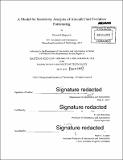A model for sensitivity analysis of aircraft fleet evolution forecasting
Author(s)
Mugica, Edward A., Jr
DownloadFull printable version (12.14Mb)
Other Contributors
Massachusetts Institute of Technology. Department of Aeronautics and Astronautics.
Advisor
R. John Hansman.
Terms of use
Metadata
Show full item recordAbstract
As demand for the long range and high speed travel of commercial aviation continues to grow, the economic and environmental impacts of the industry are being scrutinized. One fleet performance metric that provides insight into these economic and environmental impacts is fuel burn. The total fuel burn of the commercial fleet is strongly influenced by fleet makeup, and therefore an understanding of how the fleet evolves over time provides insight into how these impacts will progress. In order to study trends in fleet evolution, a model has been developed with the focus of providing insight on the potential effects of different input sets and modeling assumptions on the predicted make-up of the future fleet. Using this model, test case analyses are performed on inputs and assumptions of interest, including aircraft retirement strategies, aircraft procurement strategies, demand forecasts and future aircraft performance. This study considers the sensitivity of fleet evolution and fleet-wide fuel burn performance to these inputs and assumptions of interest. An analysis of retirement strategies found that assigning newer aircraft to missions that required more fuel burn increased the fuel bum savings over a strategy which did not consider the fuel burn performance of aircraft when making replacement decisions. Furthermore, a study of procurement strategies showed that procuring more fuel efficient aircraft at higher rates than less efficient aircraft created fuel burn savings, but also that the entry into service date of an aircraft had a significant impact on the market share of that aircraft. A study of future aircraft design decisions showed that producing a more efficient aircraft may not lead to overall fuel burn savings if that aircraft takes longer to produce than a less efficient aircraft over a given timeframe. Finally, a study of the growth in passenger travel showed that increasing the amount of travel provided by the commercial fleet also increased the total fuel burn of the fleet, but that it is possible to provide the same amount of travel using many low capacity flights or fewer high capacity flights without affecting fleet wide fuel burn, depending on the fuel burn performance of the aircraft considered.
Description
Thesis: S.M., Massachusetts Institute of Technology, Department of Aeronautics and Astronautics, 2015. Cataloged from PDF version of thesis. Includes bibliographical references (page 62).
Date issued
2015Department
Massachusetts Institute of Technology. Department of Aeronautics and AstronauticsPublisher
Massachusetts Institute of Technology
Keywords
Aeronautics and Astronautics.